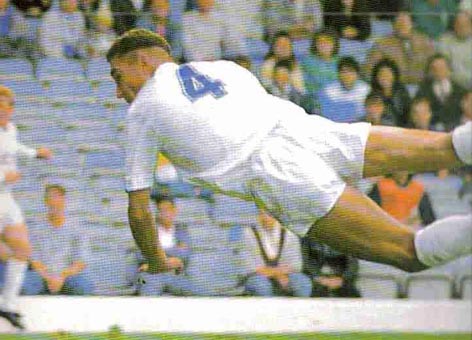

Jones: Vincent Peter (Vinnie)
1989-1990
(Player Details)
Midfield
Born: Watford: 05-01-1965
Debut: v Middlesbrough (h) (substitute): 23-08-1989
5’11” 11st 10 lb (1993)
#40 in 100 Greatest LUFC Players Ever

Jones was born in Watford and his father was a gamekeeper. He started his football career
in 1984 at Gola Conference side Wealdstone, during which time he combined playing football
with being a hod-carrier on building sites. Notoriety seemed to follow Jones from his early
days almost as soon as his potential as a ball-winning midfielder was discovered in parks
football. He played twelve times for Wealdstone in the 1984-85 season when the club won the
prized double of the Gola League Championship (later Conference) and the F.A. Trophy as well
as the Capital Football League and the Middlesex Senior Cup. He scored twice in twenty-six
games in the following season and at the end of it went to Sweden and played one season with
second-level Swedish club IFK Holmsund, where he played centre-half and scored once in
twenty-two games in helping them win the series. He was offered a signing on fee of £10,000
and £400 per week, but he preferred to return to London and take up the offer of a trial
with Harry Bassett's Wimbledon. He was taken on soon after the trial period in November 1986
and he signed for Wimbledon for a fee of £8,000 and a further £7,000 after he had played
twenty-five games, which both went to Wealdstone and £150 oer week plus £50 per goal and £50
per first team appearance. He soon built up his bad boy image as he was sent off three
times in his early days with them, including in a friendly on the Isle of Wight. He was
part of the 'Crazy Gang' team that won the FA Cup in 1988, arguably the club's greatest
achievement. In his first spell with Wimbledon he scored nine goals in seventy-seven League
games. Dubbed ‘Psycho’ by the media, in June 1989, he moved to Leeds for £650,000 and
arrived at Elland Road with his bad-boy image in one of the most talked about transfers of
the season. During his season at Leeds United, he proved that he could prosper and play well
without the illegal side of his game, and under the stewardship of Howard Wilkinson only
received three yellow cards in the whole season. He became a Leeds cult figure and his
enormous throw-ins were a regular source of goals as he played his part in the rise of Leeds
United from the Second Division to the First Division, and added a Second Division
Championship medal to his collection. The close-season signing of Gary McAllister from
Leicester City saw the writing on the wall for Jones and he only featured in one game in the
top flight before he moved to Sheffield United on 11th September 1990 for £700,000, after
fifteen happy months at Leeds. After scoring twice in thirty-five games at Bramall Lane, the
following August saw him move to Chelsea for £575,000. He scored four times in forty-two
League games, once in four F.A. Cup starts, twice in five Zenith Data Cup games and also
played one League Cup game without scoring while at Stamford Bridge in what was a reasonably
successful stay, but he lowered the bar to an all-time low, when, having been made captain
for the day against his former club Sheffield United in the 5th Round of the F.A. Cup on
15th February 1992, he had his name take after just three seconds for a foul on Dane
Whitehouse and to compound his misery he was substituted after fifty-five minutes. He
completed the circle when he moved back to Wimbledon again in September 1992 for £700,000.
In his second spell he scored twelve goals in one hundred and seventy-seven games making it
over two hundred and fifty games in his two spells for the Dons. He briefly became
player/coach of Queens Park Rangers in March 1998 after being transferred for £500,000. A
succession of poor results under Ray Harford meant that the plan for Harford to groom Jones
to be the next manager never eventuated. The final straw came when after an away defeat the
team came back in the rain and found that the Manager's sponsored car had been broken into,
the stereo had been stolen. The following Monday morning Harford resigned.Jones was
overlooked for the vacant post of manager and he announced his retirement from the game in
June 1999. He only scored once in nine games during the brief stay at Loftus Road. While a
footballer, he had become quickly infamous for his brutal "hard man" image, which frequently
brought much criticism of his style of play. He was sent off twelve times in his career,
including once while playing for Wales. In one notorious incident he had distracted Paul
Gascoigne by grabbing his testicles. During another match, he ended the career of Tottenham
Hotspur defender Gary Stevens with a vicious tackle. However, he also was the presenter of
the infamous “Soccer’s Hard Men” video released in 1992, which featured archived footage of
himself and many other "hard men" of the game, and included advice for budding "hard men".
After the release of the video, Jones received a £20,000 fine from the FA for "bringing the
game into disrepute." A high point in his football career was when he was chosen to play
international football for Wales. Despite his Welsh surname, the qualifying relationship was
his grandfather on his mother’s side, who came from Ruthin, in North Wales. He earned nine
caps and even captained the side. His Welsh debut came on 14th December 1994 at Cardiff Arms
Park in a 0-3 defeat by Bulgaria in the European Championship Qualifiers and his second was
in the return game at the Wassil Levski Stadium in Sofia on 29th March 1995, when Wales went
down 1-3. His third game in the same competition brought a 1-1 draw aginst Germany at the
Rhein Stadium, Dusseldorf, on 26th April 1995. But it was his fourth game that got him into
the headlines for all the wrong reasons. Again in the European Qualifiers, he was red carded
after just twenty-five minutes in the 0-1 loss to Georgia at Cardiff Arms Park on 7th June
1995. He was not selected for the next four internationals but was recalled a year later for
a 0-2 defeat by Switzerland in a Friendly on 24th April 1996 at the Cornaredo Stadium, Lugano.
He was not picked for two World Cup Qualifier against San Marino nor the home tie with the
Netherland in the same competition, but he was recalled, and by general acclaim was given the
Captain's armband for the return match with the Netherlands at the Philips Stadium in
Eindhoven on 9th November 1996. There was no happy ending as the Dutch showed no mercy to win
7-1 and Jones never captained Wales again. His seventh cap was gained on 14th December 1996
in a 0-0 draw with Turkey, again in the World Cup Qualifiers at Cardiff Arms Park. His eighth
cap came in another 0-0 draw at Cardiff Arms Park, this time in a Friendly against the
Republic of Ireland on 11th February 1997 and in his ninth and final game again at Cardiff
Arms Park on 29th March 1997 Wales were beaten 2-1 by Belgium. Jones has stated that he would
eventually like to return to football, possibly with Leeds United. He told Yorkshire Radio "I
will come back without a doubt, Leeds fans gave me so much and it's a club very close to my
heart." He carved out an acting career based on his “hard man” image, with several successful
box-office hits starting with “Lock, Stock and Two Smoking Barrels”, and has appeared on
many adverts and featured in many media stories, many controversial, but while seemingly
type-cast, there seems no lack of demand for him to re-enforce his image.
| Appearances | Goals |
| League 44/2 | 5 |
| F.A. Cup 1 | 0 |
| League Cup 2 | 0 |
| Full Members' Cup 4 | 0 |
| |